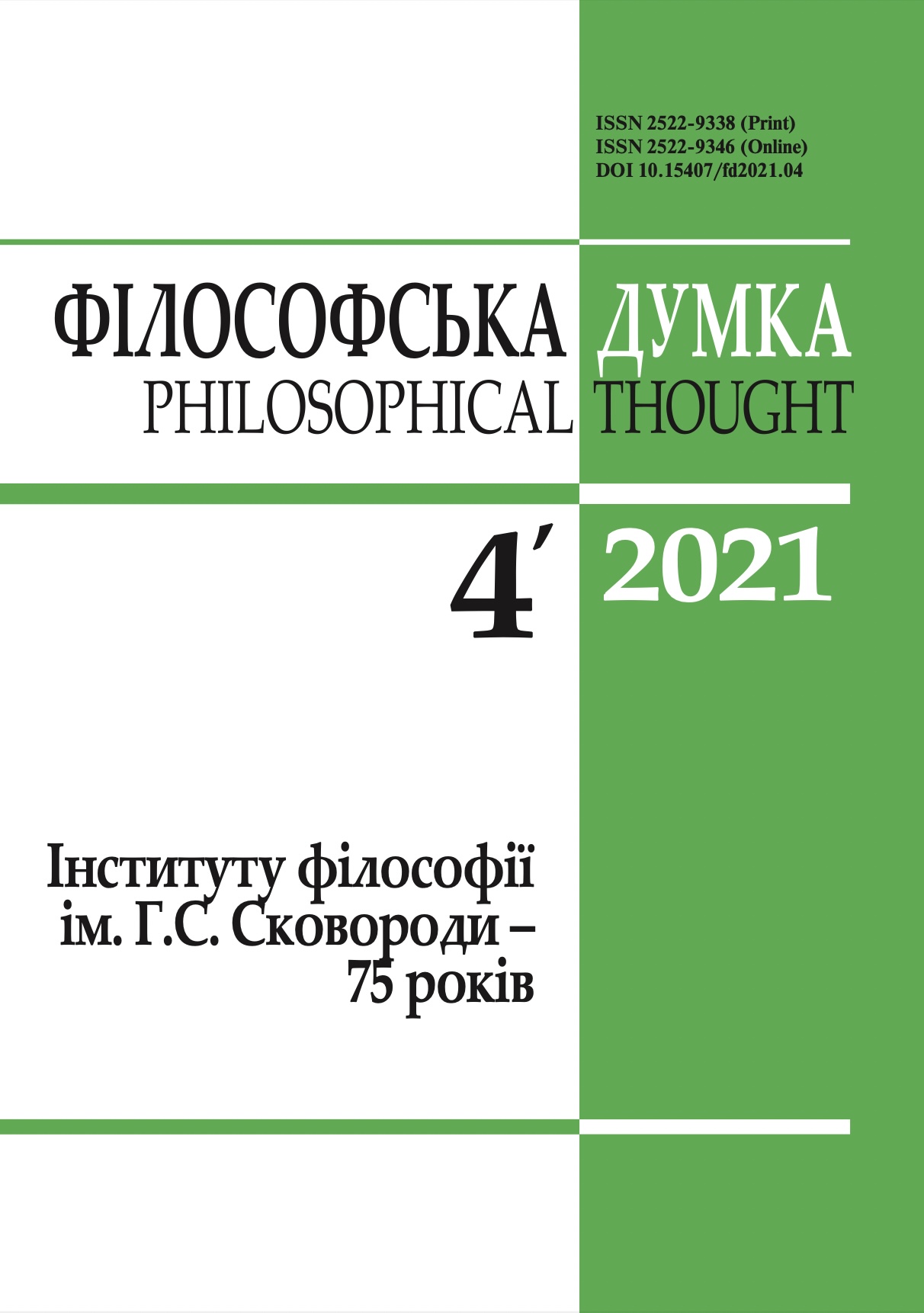MEMORY IN TERMS OF LOGIC AND SEMIOTICS
ANALYTICAL PHILOSOPHY
DOI:
https://doi.org/10.15407/fd2021.04.142Keywords:
memory phenomenon, semantic memory, temporal logic, time/tense classification, orientation axis, pseudo-memory, experienceAbstract
The phenomenon of memory is considered as a component implicitly present in the process of information communication. A short typology of memory kinds that form a referential field around so-called semantic memory is given. Through the approaches of Yu. Lotman and R. Jacobson, the classical notion of time is considered through the relationship "Past-Present-Future", which is closely related to the problems of memory. The focus is on how could the memory be considered within logic and by means of logic? As one of the ways of solving the point, to apply the tools of tense logic to the problem through the analysis of the works of Anatoly Ishmuratov (1946–2017), a prominent Ukrainian logician, is proposed. The classifications of the tenses by O. Jespersen, H. Reichenbach, W. Bull are considered. The subjective and objective axes of orientation, which form the basis of calendars, charts and scales, as fragments of time, are analyzed. According to Ishmuratov, these instruments – schemes, diagrams, etc. can be considered languages. The possibility of language objectification of meaning determines the relationship of logical inference, and thus the structuring of semantic areas, which are memories, by means the language of logic and in accordance with its structures. Through the study of logical and cognitive conditions of action, A. Ishmuratov continued to develop ideas of tense logic and their application to explain the psychological perception of objective time. He construed a scheme of semantic connections of memory as a mental act that reproduces the life path of the individual; he distinguished between memories and "pseudo-memories", which together influence the reassessment of past events, shape the individual`s experience and his ability to construe alternatives to the future and reasoning about it. A special place in A. Ishmuratov's research is occupied by his explication of temporal three-valued logic and application of temporal modalities to the analysis of so-called transient states. Further study of such approaches could help to make sense of rational explication of memory, testimonies, reminiscences of past events and give interesting results.
References
Bernecker, S. (2009). Memory: A Philosophical Study. Oxford: Oxford University Press.
https://doi.org/10.1093/acprof:oso/9780199577569.001.0001
Bull, W. E. (1968). Time, Tense and the Verb. Berkeley, Los Angeles: University California Press.
Champagne, M. (2016). Diagrams of the Past: How timelines can aid the growth of historical knowledge. Cognitive Semiotics, 9(1), 11-44.
https://doi.org/10.1515/cogsem-2016-0002
DeCarrico, J. S. (1986). Tense, Aspect, and Time in the English Modality System. TESOL Quarterly, 20(4), 665-682.
https://doi.org/10.2307/3586517
Golovakha, Ye.I., Кronik, А.А. (1984). Psychological time of personality. [In Russian]. Кyiv: Naukova Dumka.
Ishmuratov, А.Т. (1981). Logical Theories of Temporal Contexts (Tense Logics). [In Russian]. Kyiv: Naukova Dumka.
Ishmuratov, А.Т. (1987). Logical Analysis of Practical Reasoning. [In Russian]. Кyiv: Naukova Dumka.
Ishmuratov, А.Т. (1997). Introduction to Philosophical Logic. [In Ukrainian]. Kyiv: Abrys.
Jacobson, R. (1999). Yurii Tynianov in Prague. Texts, documents, investigations. [In Russian]. Moscow.
Jespersen, О. (1958). The Philosophy of Grammar. [In Russian]. Мoscow: Publishing House of Foreign Literature.
Kebuladze, V. (2005). Phenomenology. Tutorial. [In Ukrainian]. Kyiv: PPS.
Lotman, Yu.M. (1992). Brain - Теxt - Culture - Artificial Intelligence. Articles on Semiotics and Typology of Culture (vol. I, pp. 25-34). [In Russian] Tallinn: Aleksandra
Navrotskyi, V. (2005). The logic of social interaction. [In Ukrainian]. Kharkiv: Consum.
Peirce, C.S. (1931-1935). CP: Collected Papers of Charles Sanders Peirce (Eds.: Ch. Hartshorne, P. Weiss, A. Burks), Vols. I-VI. Cambridge, MA: Harvard University Press.
Pietarinen, A.-V. (2014). Natural propositions naturalized. Cognitive Semiotics, 7(2), 297-303.
https://doi.org/10.1515/cogsem-2014-0015
Scragg, G. (1978). Semantic Nets as Memory Methods. In: E. Charniak, Y. Wilks (Eds.), Computational Semantics (pp.101 -128). Amsterdam etc.
Squire, L.R., Kandel, E. (1999). Memory: From Mind to Molecules. New York: Scientific American Library.
Tulving, E. (1972). Episodic and Semantic Memory. In: E. Tulving, W. Donaldson (Eds.), Organization of Memory (pp. 382-404). New York: Academic Press.
van Benthem, J. (2007). Logic, Rational Agency, and Intelligent Interaction. In: Proceedings Beijing 2007 DLMPS Conference. S.l.
Viatkina, N.B. (2021). Reference mechanisms for the deconstruction of cultural codes, experience, and memory in terms of logic and semiotics. [In Ukrainian]. In: Semiotic analysis of cultural phenomena. Monograph (ch. V, pp.172-218).. Kyiv: H.S. Skovoroda Institute of Philosophy, National Academy of Sciences of Ukraine. Retrieved from: https://www.filosof.com.ua. Biblioteka.html
von Wright, G.H. (1986). Explanation and Understanding. [In Russian]. Moscow: Progress
Downloads
-
PDF (Українська)
Downloads: 302
Published
How to Cite
Issue
Section
License
Authors who publish with this journal agree to the following terms:
- Authors retain copyright and grant the journal right of first publication.
- Authors are able to enter into separate, additional contractual arrangements for the non-exclusive distribution of the journal's published version of the work (e.g., post it to an institutional repository or publish it in a book), with an acknowledgement of its initial publication in this journal.
- Authors are permitted and encouraged to post their work online (e.g., in institutional repositories or on their website) prior to and during the submission process, as it can lead to productive exchanges, as well as earlier and greater citation of published work (See The Effect of Open Access).


